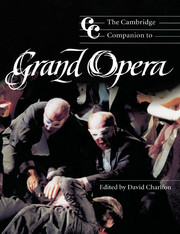Book contents
- Frontmatter
- 1 Introduction
- Part I The resourcing of grand opera
- Part II Revaluation and the twenty-first century
- Part III Grand operas for Paris
- 9 La Muette and her context
- 10 Scribe and Auber: constructing grand opera
- 11 Meyerbeer: Robert Ie Diable and Les Huguenots
- 12 Meyerbeer: Le Prophète and L'Africaine
- 13 The grand operas of Fromental Halévy
- 14 From Rossini to Verdi
- 15 After 1850 at the Paris Opéra: institution and repertory
- Part IV Transformations of grand opera
- Notes
- Select bibliography
- Index
9 - La Muette and her context
from Part III - Grand operas for Paris
Published online by Cambridge University Press: 28 November 2011
- Frontmatter
- 1 Introduction
- Part I The resourcing of grand opera
- Part II Revaluation and the twenty-first century
- Part III Grand operas for Paris
- 9 La Muette and her context
- 10 Scribe and Auber: constructing grand opera
- 11 Meyerbeer: Robert Ie Diable and Les Huguenots
- 12 Meyerbeer: Le Prophète and L'Africaine
- 13 The grand operas of Fromental Halévy
- 14 From Rossini to Verdi
- 15 After 1850 at the Paris Opéra: institution and repertory
- Part IV Transformations of grand opera
- Notes
- Select bibliography
- Index
Summary
The ‘first’ grand opera, La Muette de Portici, has been remembered since its première in 1828 for its revolutionary sentiments: the depiction of a violent but unsuccessful revolt in seventeenth-century Naples, resonant with the events of 1789. Two years later it was performed following the successful July Revolution in Paris and it apparently sparked the Belgian revolt against the Dutch in the same year, which resulted in the independence of Belgium. Thereafter it was regularly recognised in France as a symbol of national spirit, during such events as the 1870–71 Franco-Prussian War. At this same moment, Wagner famously associated the opera with subsequent political events, recalling how ‘[La Muette], whose very representations had brought [revolts] about, was recognised as the obvious theatrical precursor of the July Revolution, and seldom has an artistic product stood in closer connection with a world-event’. More than a century after Wagner, Jane Fulcher commenced her book on the political role of opera in nineteenth-century Paris with an assessment of La Muette as a dangerous and seditious work with a populist message.
Yet, in spite of the undoubted turbulence in Paris in 1828, it was not the political aspect of the opera that exercised its first audiences and critics, but rather its mute heroine. This is shown not only by the reports of the Opéra's literary committee and by newspaper reviews, but also by the unprecedented response of various state-funded and commercially run theatres in the city.
- Type
- Chapter
- Information
- The Cambridge Companion to Grand Opera , pp. 147 - 167Publisher: Cambridge University PressPrint publication year: 2003

